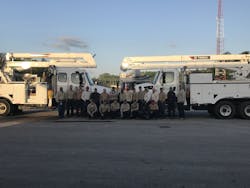Service Makes the Difference for Co-op Preparing for Hurricane Response
Berkeley Electric Cooperative serves nearly 100,000 members along the central South Carolina coast and operates several hundred vehicles, including about 60 aerial devices and digger derricks.
In preparation for Hurricane Florence’s impending arrival in the fall of 2018, the Engineering & Operations department needed access to a frontline Terex Hi-Ranger TL45 aerial device that was undergoing a required five-year rebuild at the Terex Service Center in Charlotte, North Carolina.
“Normally, we would not schedule aerial devices for service work during the hurricane season,” says Tommy Harvey, manager of distribution operations for Berkeley Electric Cooperative, headquartered in Moncks Corner, South Carolina. "But based on the number of other units that were due for the required rebuild next year, it was necessary to do so to juggle the budget."
About 48 hours prior to Hurricane Florence’s arrival, Harvey contacted the Terex Service Center to see what could be done about getting the unit back.
“That afternoon, they put the unit back together minus some cosmetic finishes, but it still needed to pass the dielectric test. They expedited that for us. By the afternoon they confirmed the unit had passed the dielectric test and agreed to drive it to us that night. We met at mid-point about 150 miles from our facilities to take possession of the unit,” Harvey says.
Responsive Solutions
Terex only had one day to get Berkeley’s Terex Hi-Ranger TL45 back to the cooperative.
“A complete overhaul had just been completed ahead of schedule and sent to paint," says Ron Ryals, territory sales manager, Charlotte, North Carolina. "When we got the call, we pulled the unit from the paint production area, re-installed parts that had been removed for the painting process, and performed operation checks and the dielectric test to make sure this truck would be safe for Berkeley’s team to use.”
Painting the unit was rescheduled for after the hurricane had passed.
“Being responsive and acting quickly enabled us to meet the customer’s needs,” Ryals says.
Meanwhile, other Terex Service Center team members were preparing to be able to respond in the wake of the hurricane. This included having staff members to cover calls for parts and shipping of parts on a Saturday. Communication was sent out to customers in the area to call 1-844-TEREX-4U for parts orders or parts research.
Peter King, national parts manager, explained that normally parts and warehouse employees don’t work on Saturday.
“But with the hurricane predicted to make landfall on a Friday, we wanted to give customers the ability to have parts by Monday if a truck went down,” King says.
In addition, a dozen technicians were put on standby in the area prepared to go into affected areas. Communications were sent to customers in advance providing direct cell phone numbers of four field service operations managers, who would personally assign the calls to technicians as needed.
In emergency situations, utility companies are working as quickly as possible, and eliminating any roadblocks for them is a priority for Terex Utilities.
King gave one other example: “When Hurricane Harvey hit Houston, we suspended the 30-day term on payments to give them extra lead time as they worked hard to restore power to communities,” he says.
Need for Service
Scheduled rebuilds are a big investment, and the cooperative requires the Terex team to consider whether to keep the unit or get rid of it.
"In an ideal world, we prefer for the OEM to do the rebuild on their models, as was the case with this Terex unit,” Harvey says. “Although service is a cost-driven decision, if bids are close we prefer to use Terex. There are a lot of options for digger derricks and bucket trucks. But we patronize those who service us best. Terex always has parts in stock or can get them to us the next day.”
When the cooperative makes a quarter-of-a-million-dollar investment in a piece of equipment, it plans to use it as a frontline truck for 12 to 15 years, Harvey says. After that, it goes into the pool as a spare.
"That’s a lot of years of service, and service makes the difference in the long run,” Harvey says.
Ultimately, Berkeley Electric Cooperative received the Terex Hi-Ranger TL45 with a day left to get it restocked and ready to respond to outages. At the height of damage, the cooperative had about 2500 members without power. Having the bucket truck back in the fleet helped the cooperative respond to their customers’ needs as quickly as possible and reduced overall recovery time.
